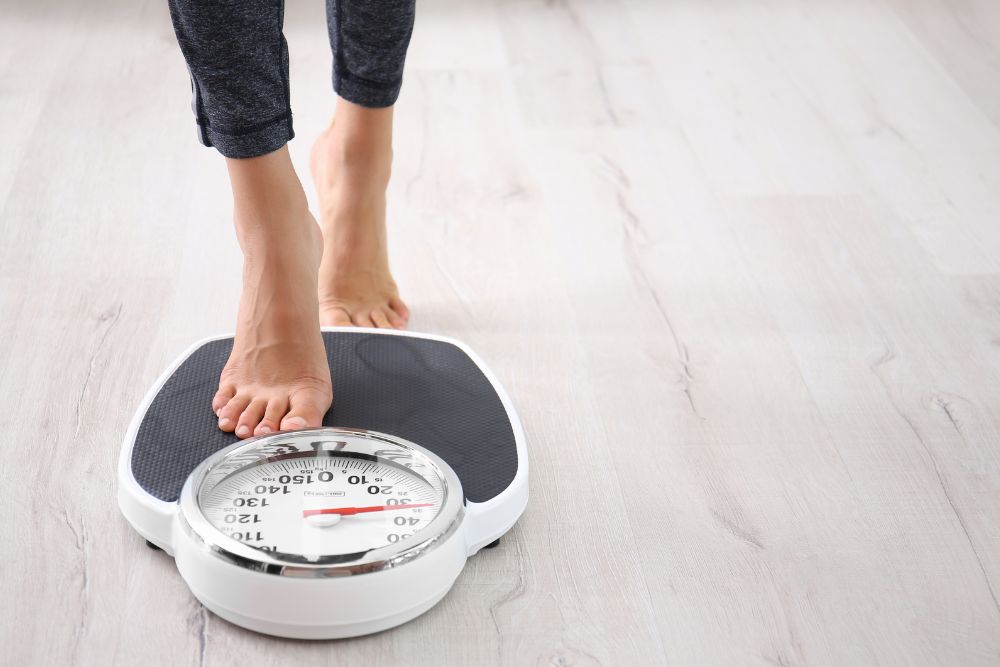Weight loss tablets in Australia
- Prescription medications
- Tablets for weight loss
- Trusted medical experts
- Ongoing patient support
Prescription weight loss tablets
Weight loss tablets are typically recommended when traditional methods such as dietary changes, exercise, and lifestyle modifications have not proven effective in achieving weight loss. They work through various mechanisms, including appetite suppression, metabolism enhancement, and craving control.
Weight loss tablets are generally prescribed for people with a body mass index (BMI) of 30 or higher, or for those with a BMI of 27-30 who have weight-related health concerns, such as hypertension or type 2 diabetes. It is essential to use these medications under the supervision and guidance of a healthcare professional to ensure their safety and effectiveness in addressing your specific weight management needs.
Get weight loss treatments online
Initial consultation only $49

Regulate the brain’s hunger signals to help you feel fuller for longer.

Control cravings by targeting the brain’s desire for specific foods.

Satisfy hunger while providing the nutrients that your body needs every day.

Regulate the brain’s hunger signals to help you feel fuller for longer.

Control cravings by targeting the brain’s desire for specific foods.

Satisfy hunger while providing the nutrients that your body needs every day.
How Do Weight Loss Tablets Work?
Weight loss tablets work in various ways to support your weight loss journey. Some tablets help you feel less hungry by affecting the brain, making it easier to control portions and avoid snacking. Others can increase your metabolism, helping your body burn calories more efficiently. Some tablets combine different ingredients to reduce cravings for high-calorie foods, and the likelihood of overeating. Overall, these tablets can be a helpful tool when combined with balanced eating and regular movement (1).
How Effective Are Weight Loss Tablets?
Weight loss tablets can help people lose more weight when combined with behavioural changes like balanced eating and exercising. A study by Yanovski and Yanovski (2014) found that some weight loss tablets can help people lose an extra 3% to 9% of their body weight compared to those who don’t take them. For many, this means losing at least 5% of their starting weight (1,2).
How Long Until You See Results?
The time it takes to see results from weight loss tablets can vary. Generally, you might start to notice some changes within a few weeks, but more significant weight loss typically occurs after a few months. If there is no meaningful weight loss after 12 weeks, it might be worth discussing with your doctor whether to continue or try a different weight loss approach (1).
Always work closely with your healthcare provider when using weight loss medications, and maintain open communication about your progress and any worries. They can guide the expected timeline for seeing results and help you make informed decisions throughout your weight loss journey.
How Do You Take Weight Loss Tablets?
Taking weight loss tablets is straightforward. You swallow them with water, following the prescribed schedule provided by your healthcare provider. It might be once a day or more, depending on the medication. The key is to stick to the recommended dose and timing carefully. This ensures you get the most benefit while reducing any potential side effects.
Are There Side Effects of Weight Loss Tablets?
Weight loss tablets can have side effects, which vary depending on the specific medication. Common issues include dry mouth, insomnia, dizziness, and gastrointestinal problems like diarrhoea or constipation. Some tablets may also increase heart rate or blood pressure and cause sleep problems, anxiety, stomach pain, nausea, fatigue, joint pain, headaches, and liver issues at high doses. Other potential side effects include psychiatric effects such as anxiety and a risk of suicide. Longer-term studies are often needed to fully understand these risks. Discussing potential side effects with a doctor is essential to weigh the benefits and risks before starting any weight loss medication (1,3).
Weight loss that works for you
Quick and
easy consults
Fast
delivery
Access to trusted
medical experts
Ongoing
support
Discreet
packaging
Never miss
a repeat
Frequently asked questions
What type of weight loss treatments do you offer?
The treatments offered by hub.health include a range of both prescription weight loss medication and over the counter products. Our qualified doctors and nurse practitioners put patient care first, so a telehealth consult is required for all new prescriptions, which may include weight loss injection treatments. Over the counter products can be added to your cart and purchased directly.
How do weight loss medications work?
It’s important to note that these medications are prescription-only and should only be taken under the guidance of a healthcare professional in conjunction with a healthy diet and exercise program.
What results can I expect from these treatments?
- Physical health improvements to important health markers, such as blood pressure, blood sugar levels, cholesterol levels, sleep quality, and joint pain, and a reduced risk of developing obesity-related diseases, such as heart disease, stroke, and type-2 diabetes.
- Mental health improvements, such as improved self-esteem, mood, and confidence, and reduced symptom severity of depression and anxiety.
- Improved quality of life, including increased energy levels, better mobility, and the ability to engage in activities that may have seemed off-limits due to excess weight.
- Weight reduction has been shown in several studies. However, the amount of weight loss can vary depending on the duration of treatment, and personal adherence to a healthy lifestyle.2
It’s important to note that weight loss meds are not a magic solution. They must be used in combination with a healthy diet and regular exercise for the best results.
How long does it take for my weight loss medications to arrive?
Once you’ve approved and paid for your medication, our pharmacist will organise fast and discreet delivery. You should receive your medication within 1-3 days, depending on your delivery location.
If you are not home when your medication is delivered, Australia Post will leave it in a safe place, if there is one. If they can’t find anywhere safe to leave it, it will be left at the closest collection point.
How do you deliver medication if it needs to be refrigerated?
hub.health offers cold chain delivery anywhere in Australia. This means your medication will remain cold during transit and be delivered to your door in cold packaging.
Can I speak to my medical team at any time?
Of course! If you log into your profile and head to the ‘Products’ tab, you will see a ‘Manage Treatment’ button. Click this and you’ll see the ability to send a message to your clinician. If you’re having any issues, just drop us a line at [email protected]
Check out our latest articles:
Sources
Weight prevalence, reporting, impact and experience:
- Yanovski SZ, Yanovski JA. Long-term drug treatment for obesity: a systematic and clinical review. JAMA. 2014;311(1):74-86. doi:10.1001/jama.2013.281361
- Greenway, F. L., Fujioka, K., Plodkowski, R. A., Mudaliar, S., Guttadauria, M., Erickson, J., et al. (2010). Effect of naltrexone plus bupropion on weight loss in overweight and obese adults (COR-I): a multicentre, randomised, double-blind, placebo-controlled, phase 3 trial. The Lancet, 376(9741), 595-605. DOI: 10.1016/S0140-6736(10)60888-4.
- Bello NT. Update on drug safety evaluation of naltrexone/bupropion for the treatment of obesity. Expert Opin Drug Saf. 2019;18(7):549-552. doi: 10.1080/14740338.2019.1618268.
- Australian Institute of Health and Welfare. Overweight and obesity [Internet]. Canberra: Australian Institute of Health and Welfare; 2023 [cited 2024 Jun 4].
Jastreboff AM, Aronne LJ, Ahmad NN, Wharton S, Connery L, Alves B, et al. Tirzepatide Once Weekly for the Treatment of Obesity. N Engl J Med. 2022 Jul 21;387(3):205-216. doi: 10.1056/NEJMoa2206038. Epub 2022 Jun 4. PMID: 35658024. DOI: 10.1056/NEJMoa2206038.
Jain AK, Kaplan RA, Gadde KM, Wadden TA, Allison DB, Brewer ER, et al. Bupropion SR vs. Placebo for Weight Loss in Obese Patients with Depressive Symptoms. Obesity. First published: 06 September 2012.
Weintraub M, Sundaresan PR, Madan M, Schuster B, Balder A, Lasagna L, et al. Long-term weight control study I (weeks 0 to 34): The enhancement of behavior modification, caloric restriction, and exercise by fenfluramine plus phentermine versus placebo. Clin Pharmacol Ther. First published: May 1992.
Mehta A, Marso SP, Neeland IJ. Liraglutide for weight management: a critical review of the evidence. Obes Sci Pract. First published: 09 November 2016.
Jastreboff AM, Aronne LJ, Ahmad NN, Wharton S, Connery L, Alves B, et al. Tirzepatide Once Weekly for the Treatment of Obesity. N Engl J Med. 2022;387:205-216. DOI: 10.1056/NEJMoa2206038.
Wilding JPH, Batterham RL, Calanna S, Davies M, Van Gaal LF, Lingvay I, et al. Once-Weekly Semaglutide in Adults with Overweight or Obesity. N Engl J Med. 2021 Feb 10;384(11):989-1002. DOI: 10.1056/NEJMoa2032183.





